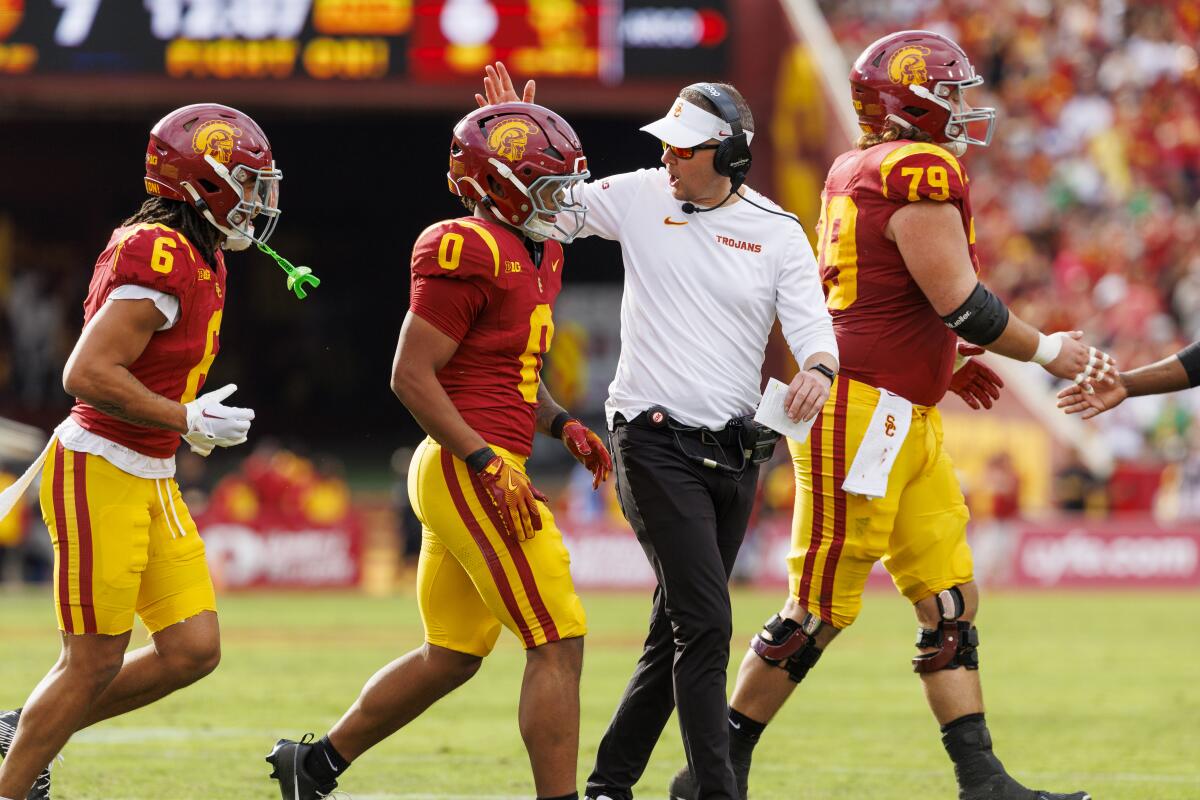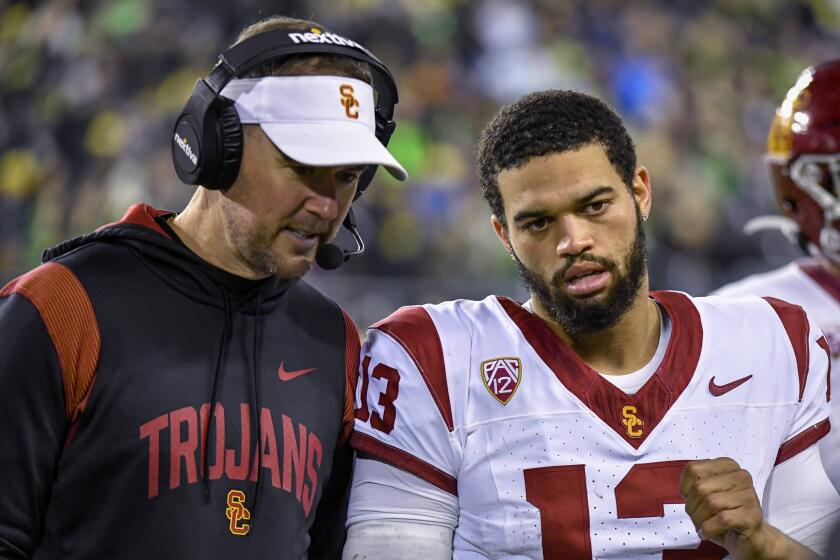USC coach Lincoln Riley suggests there is no reason to panic as Trojans shop in portal

- Share via
The transfer portal was open less than 24 hours when Lincoln Riley appeared on USC’s “Trojans Live” radio show Monday night. Already by that point, 11 players had announced their plans to hit the portal, among them the Trojans’ right tackle, Mason Murphy, and running back of the future, Quinten Joyner — two departures that stir red a frustrated fan base into a portal-induced panic.
So when Riley was asked about his approach to the transfer market, he had a point to make. College football, the coach opined, was now basically “a professional model.” That meant “making some tough decisions” about “where to allocate reps or where to allocate resources, roster spots, all of those things.”
“The reality is there’s just some guys that you just can’t or are not going to pay what they want,” Riley said. “If your value doesn’t match the money, then it’s not going to go well much longer, it’s not going to go further. There’s a cutthroat part of that that is just part of being a professional organization, and again, that’s what we’re becoming.”
In other words, the players weren’t the only ones at USC making shrewd business decisions.

“You’re getting ready to reduce roster size, you’re getting ready to have a salary cap essentially,” Riley said. “You’re going to see sometimes people that feel like, ‘I got a better opportunity to go play at this place or that place,’ and sometimes — more often than what people realize now — it’s the school telling the kid, ‘Hey we’re sorry. This just is what it is right now.’”
As its roster stands, USC probably could have used a potential star running back and an offensive tackle with years of starting experience. With Murphy and Joyner departing, both the backfield and the offensive line represented glaring holes that Riley probably would have to plug through the portal.
And the exodus continued Tuesday afternoon as one of the Trojans’ top young receivers, Duce Robinson, also entered the portal.
Riley hasn’t had any issue finding replacements at running back in the past. In each of his three seasons at USC, the coach successfully recruited a new transfer to lead the backfield, hitting on Travis Dye, MarShawn Lloyd and Woody Marks in consecutive seasons.
Lincoln Riley has struggled through his USC tenure, but pro football executives see a path for him to be an NFL head coach or offensive coordinator.
Joyner was supposed to be the first of Riley’s homegrown backs at USC to stop that cycle, taking the reins of the Trojans’ run game after developing behind both Lloyd and Marks. He averaged 7.6 yards per carry this season, flashing glimpses of explosive star potential when given the opportunity.
But running behind Marks — an Associated Press All-Big Ten second-team selection — Joyner never quite carved out a consistent role. He received more than six carries in a game just three times in two seasons. It wasn’t until Marks left because of an injury in the first quarter of USC’s season finale against Notre Dame that Joyner was asked to power the offense during a critical stretch. He responded by rushing for 83 yards on a career-high 10 carries.
A little more than a week later, Joyner was gone, and USC was again sifting through the portal for a replacement. With Marks off the NFL, 230-pound freshman Bryan Jackson will get a chance to prove himself as the lead back through bowl season. But with few options behind him, expect Riley to go back to the transfer well.
Along the offensive line, Riley said on many occasions that he hoped to move away from the portal-reliant approach USC used the previous two offseasons. Just two weeks ago the coach expressed confidence in how his young linemen were progressing.
In the upcoming weeks, Lincoln Riley will have plenty of questions to answer about USC’s direction ahead of next season
“We’ve got a lot of good-looking young linemen that are talented and going to be good players,” Riley said. “It’s been a while, probably well before I was here, since that was the case.”
But desperate times may call for further portal pursuits up front. The Trojans’ two most consistent linemen this season, center Jonah Monheim and guard Emmanuel Pregnon (also an AP All-Big Ten pick), soon will declare for the NFL draft. USC’s only reserve linemen with extended experience, guards Gino Quinones and Amos Talalele, entered the transfer portal. And with Murphy joining them, that leaves three starter spots to fill and nary a lineman with more than 100 snaps of experience to fill them.
As bleak as those circumstances may seem, USC actually has more pressing portal needs elsewhere. The Trojans are trending toward losing their entire starting secondary, assuming safety Kamari Ramsey declares for the draft as planned. They could stand to add a few veterans to their defensive front too, with depth depleted both on the line and at linebacker.
Within the portal’s first day, offers to talented defenders were rolled out in full force. Among those on USC’s immediate radar: former five-star Kentucky defensive tackle Keeshawn Silver, Elon edge rusher Cazeem Moore, Marshall linebacker Jaden Yates, Western Kentucky defensive lineman Hosea Wheeler, San José State cornerback DJ Harvey, Washington State cornerback Ethan O’Connor and Michigan safety Brandyn Hillman.

And then there’s quarterback. Riley offered a vote of confidence in his current room but made it clear he plans to pursue a passer in the portal to bolster depth behind Jayden Maiava and five-star freshman Husan Longstreet.
Utah transfer Sam Huard is an obvious dot to connect, given his family ties to USC quarterbacks coach Luke Huard. Riley also once offered a scholarship to Duke dual-threat Maalik Murphy, an Inglewood native who’s expected to be one of the more coveted quarterbacks available.
Other dominoes are still to fall. At receiver, the Trojans already lost two of their top targets, Robinson and senior Kyron Hudson, while speculation ramps up over several others.
USC, it seems, will again be busy in the portal. That’s not the route Riley hoped to be taking ahead of his fourth season at USC. But considering where his roster stands, he doesn’t really have a choice.
“I’ve said many times, I want us to be a developmental program,” Riley said. “I really want to rely on high school recruiting as much as we can. But you do have to adapt. You do have to adapt to the market. I mean, it’s changed so much. Even the fact that we even call it a market now. But it is, it is.”
More to Read
Go beyond the scoreboard
Get the latest on L.A.'s teams in the daily Sports Report newsletter.
You may occasionally receive promotional content from the Los Angeles Times.









